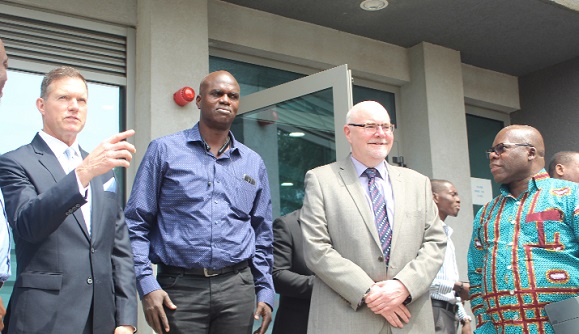
International Atomic Agency impressed with country progress
Representatives of the International Atomic Energy Agency (IAEA) have commended operators of Ghana’s nuclear programme, Nuclear Power Ghana (NPG), for developing a high-quality integrated management system and ensuring it meets the requirements for the country to achieve its energy mix agenda.
The two consultant experts of the IAEA, Mr Niel Ivison and Mr Ross Ridenoure, are in Ghana to review Ghana's integrated management system document as part of requirements by the international regulator.
Mission
Speaking at the opening of the two-day IAEA Expert Review Mission in Accra yesterday, Mr Ridenoure said: "you have done a real good job better than what we have seen in other countries that are new to nuclear system development.
You have taken an important step by developing an integrated management system.”
He commended the government for making the decision to build a nuclear plant, saying: "it is difficult to do, but when it is done well, it will lead to future growth and the spillover will help other sectors to grow the economy."
Review
The team, ahead of the visit to Ghana, had carried out a thorough review of Ghana’s integrated management system document and submitted a 40-page report that consolidates its findings and recommendations for improvement of the NPG document.
During their two days in Ghana, the experts will assess NPG’s process for establishing its integrated management systems, review NPG’s top-level management system documents, identify and discuss the enabling factors for the successful development of a management system, assist the NPG to identify and appreciate some internationally accepted standards that can help Ghana come up with the best management system and review and advise the NPG on its hierarchy system.
For his part, Mr Ivison said he had reviewed a number of emerging integrated systems and “with Ghana’s documentation, I like the way you are going about it in phases. Because we see a lot of emerging countries trying to run before they walk in their implementation of nuclear plans. We are ready to help you move forward”.
Importance
The manager of the NPG’s project management, Mr Samuel Odartey Lamptey, said the review process would help the NPG to identify gaps in its system and rectify them.
He said it would also enable the NPG to meet the high safety and security standards and all requirements of the nuclear industry.
Background
Ghana’s quest to explore the possibility of using nuclear power for electricity generation, he said started in the 1960s, but remained on the shelves before it was revived in 2015, leading to the establishment of the NPG in 2018.
The vision of the NPG, Mr Lamptey said, was to build a nuclear plant and produce affordable electricity in an environmentally friendly manner for socio economic development.
Cabinet decision
The Executive Director of the NPG, Mr Theophilus Okai, said the integrated management system was important to ensure that the various systems needed for the smooth development of Ghana’s nuclear programme did not operate in silos.
He said the NPG had prepared a Comprehensive Programme Report (CPR) that would be submitted to cabinet next month.
The report will brief cabinet on the state of Ghana’s nuclear programme and enable the government to make decisions on the way forward.
“If all things go well, Ghanaians will start enjoying the nuclear power for the first time in 2030,” Mr Okai said.
